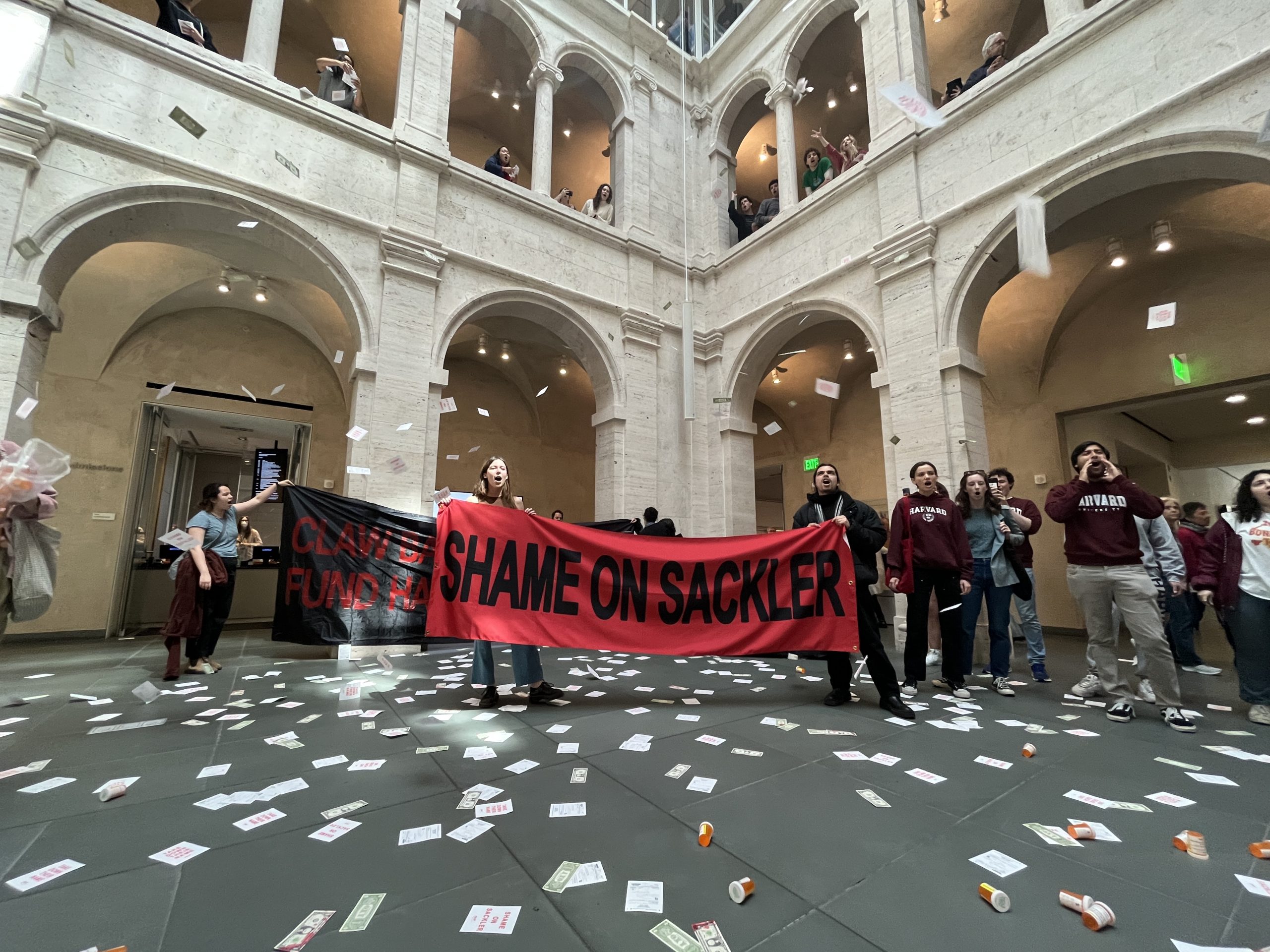Harvard University will not remove Arthur M. Sackler’s name from two of its campus buildings, concludes a 15-page report by a committee assigned to review the decision. After years of pressure from students and activists who illuminated the donor’s ties to the devastating opioid crisis fueled by the Sacklers’ pharmaceutical company, Purdue Pharma, the committee acknowledged the family’s role in the epidemic but called Arthur Sackler’s legacy “complex, ambiguous, and debatable.”
Though Arthur Sackler died in 1987, before the company began the promotion and mass distribution of the profoundly addictive opioid painkiller OxyContin, activists have long argued that he laid the foundation for the deadly marketing and over-prescribing of the drug.
“Harvard’s continued embrace of the Sackler name is an insult to overdose victims and their families,” the advocacy group PAIN Sackler (Prescription Addiction Intervention Now), founded by American photographer Nan Goldin, said in a statement shared with Hyperallergic.
“To claim that Arthur Sackler is innocent is historically inaccurate — he designed the corrupt pharmaceutical marketing scheme used by Purdue Pharma to flood America with Oxycontin, igniting the overdose crisis,” PAIN continued. “He’s as responsible as any of the Sacklers.”
A spokesperson for Harvard University declined to comment further, referring Hyperallergic back to the committee’s report.

Arthur’s name will remain on one of three art museums on Harvard’s campus as well as on a separate building serving the Faculty of Arts and Sciences. The decision comes as multiple institutions around the world, including the Metropolitan Museum of Art, the Guggenheim Museum, and the Musée du Louvre, have opted to remove the Sackler name in recent years. In 2018, PAIN staged a “die-in” at the Harvard Art Museums atrium urging the institution and others to drop the Sackler name and stop contributing to the “artwashing” of the family’s legacy.
In October 2022, members of the undergraduate campus activism group Harvard College Overdose Prevention and Education Students (HCOPES) submitted a 23-page official proposal to rename the buildings, arguing that even though Arthur’s death predated the opioid crisis, he was “far from blameless.” His “deeply unethical” marketing tactics for Valium and other medications throughout his career, they argued, served as the framework for Purdue Pharma’s successful campaign for OxyContin.
“Put simply, the ethos of the Sackler family and of Purdue Pharma can be traced back directly to Arthur Sackler,” reads a line from HCOPES’s 2022 proposal.
Pressure mounted when members of PAIN and Harvard students staged another die-in at the art museum in April 2023, decrying then-University President Lawrence S. Bacow’s 2019 assertion that removing Arthur’s name from the campus would be “inappropriate.”
In spite of these efforts, the responsible committee concluded that the arguments outlined in the proposal — particularly the points that the presence of the Sackler name was inherently painful to certain community members and that his advertising methods alone were intrinsically unethical — were ultimately not compelling enough to warrant the renaming.
Committee members instead suggested that the university contextualize Arthur’s life, legacy, and the Sackler family controversy through texts installed in prominent locations and online so that those who interact with either space “will be allowed to form their own judgments about Arthur Sackler and the naming.”

This summer, the Supreme Court blocked a controversial $6 billion settlement that would have absolved the Sacklers from any further liabilities pertaining to the opioid crisis, bringing settlement discussions back to square one. Another parameter of the rejected settlement would have allowed institutions to drop the Sackler name without penalty, regardless of any philanthropic contributions.
The university committee’s concluding report addressed that Harvard is under certain obligations regarding Sackler’s name per the gift agreement, but alluded to interpretive issues within the agreement as well as public interest in the matter when considering the proposal for renaming.
In its response to the news, PAIN pointed to a clause in the Ethics Standards put forth by the American Alliance of Museums that requires cultural institutions to “act not only legally but also ethically.”
“It’s time that Harvard stand by their students and live up to their mandate of being a repository of higher learning of history and an institution that embodies the best of human values,” PAIN said.

